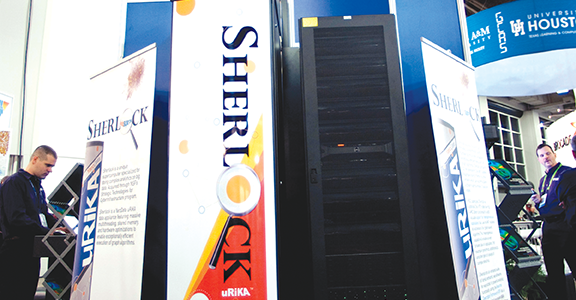Pittsburgh Supercomputing Center Celebrates New Supercomputer, Sherlock
The Pittsburgh Supercomputing Center (PSC)—a joint effort of the University of Pittsburgh and Carnegie Mellon University together with Westinghouse Electric Company—will host a celebration and symposium Feb. 1 to launch its newest supercomputer, Sherlock. A graph-analytics appliance, Sherlock is designed to discover unknown relationships or patterns hidden in extremely large and complex bodies of information.
Pitt Chancellor Mark A. Nordenberg, Carnegie Mellon President Jared Cohon, and Program Director Barry Schneider of the National Science Foundation’s Office of Cyberinfrastructure will speak, and there will also be remarks by other Pitt and CMU faculty and administrators—including PSC scientific directors Ralph Roskies and Mike Levine—as well as by Arvind Parthasarathi and Jim Harrell, the president and vice president of engineering, respectively, of YarcData, the company that built the appliance. A demonstration of Sherlock’s computing power will be performed.
The event will be held at the Pittsburgh Supercomputing Center, 300 S. Craig St., Oakland. It is open to the University community. Registration is requested at www.psc.edu/index.php/events/sherlocklaunch. A schedule and list of speakers follows.
11 a.m. Launch Celebration and Demonstration
• PSC Scientific Director Ralph Roskies, Pitt professor of physics and astronomy
• PSC Scientific Director Mike Levine, CMU professor of physics
• NSF Cyberinfrastructure Program Director Barry Schneider
• Pitt Chancellor Mark A. Nordenberg
• CMU President Jared L. Cohon
• YarcData President Arvind Parthasarathi
1 p.m. Symposium
Experts on graph analytics—the analysis of complex networks—will explain, among other topics, how Sherlock’s leading-edge algorithms for working with graphs of unprecedented size can increase knowledge about the dynamics of social networks; how the “massively multithreaded” architecture allows Sherlock to follow multiple leads in complex networks that are intractable on other computers; and how Sherlock’s graph models can be used to better understand how networks of genes and proteins cause cells to become cancerous. The experts are:
• PSC Director of Strategic Applications Nick Nystrom, a CMU research physicist;
• CMU University Professor of Computer Science and School of Computer Science Dean Randal E. Bryant;
• Pitt Professor of Biomedical Informatics Xinghua Lu;
• Pitt Postdoctoral Associate in Biomedical Informatics Songjain Lu;
• CMU Professor of Computer Science Christos Faloutsos; and
• YarcData Vice President of Engineering Jim Harrell.
Sherlock is a highly scalable, real-time platform that supports ad hoc queries, pattern-based searches, inferencing, and deduction. It features graph-optimized hardware that provides up to 512 terabytes of global shared memory, massively multithreaded graph processors supporting 128 threads per processor, and a database optimized for the underlying hardware, which enables applications to interact with the appliance using industry-standard interfaces. Working with the manufacturer, PSC experts have modified the basic uRiKA design by adding Cray XT5 nodes to broaden Sherlock’s applicability to a wider variety of research problems.
Sherlock was funded by the Strategic Technologies for Cyberinfrastructure program of the National Science Foundation through a grant of more than $1 million. This funding joins nearly $500 million in federal and industrial funding that the PSC has previously drawn to Pennsylvania.
Other Stories From This Issue
On the Freedom Road

Follow a group of Pitt students on the Returning to the Roots of Civil Rights bus tour, a nine-day, 2,300-mile journey crisscrossing five states.
Day 1: The Awakening
Day 2: Deep Impressions
Day 3: Music, Montgomery, and More
Day 4: Looking Back, Looking Forward
Day 5: Learning to Remember
Day 6: The Mountaintop
Day 7: Slavery and Beyond
Day 8: Lessons to Bring Home
Day 9: Final Lessons

